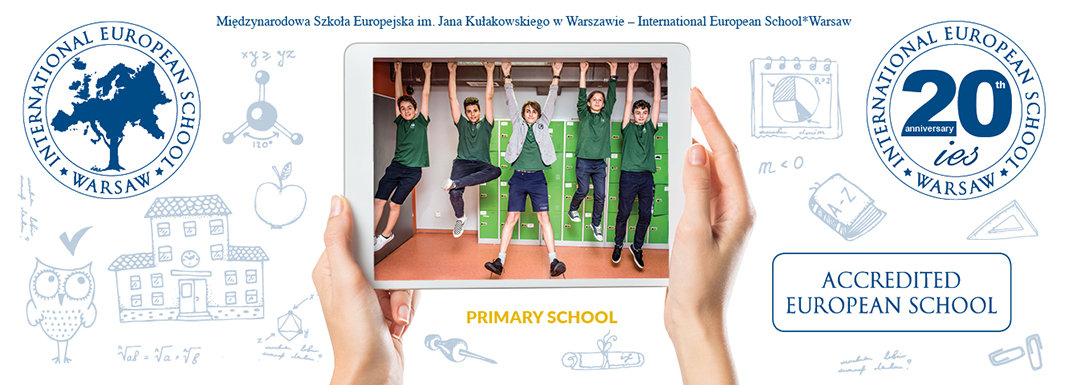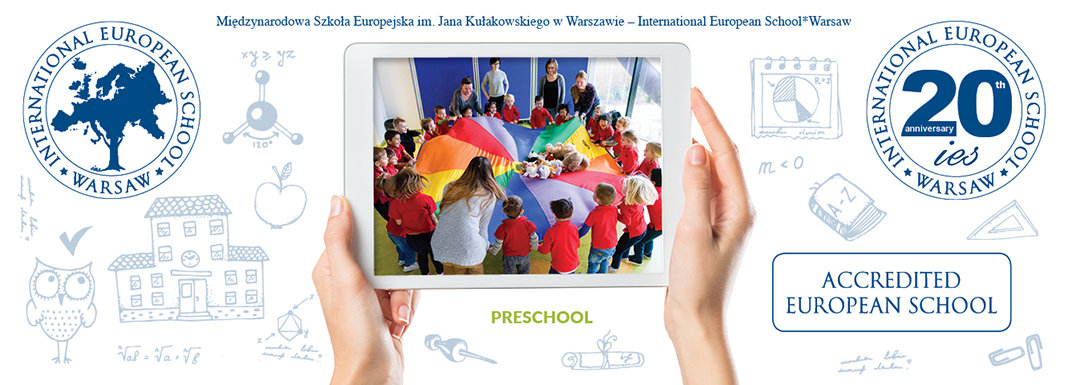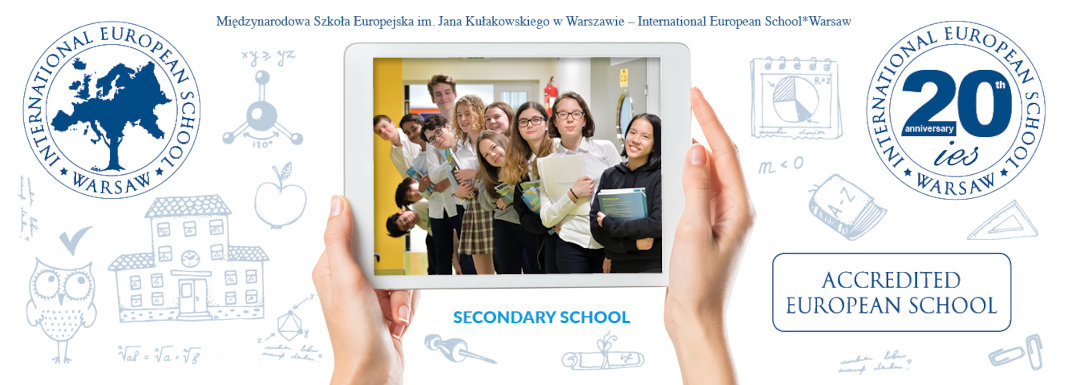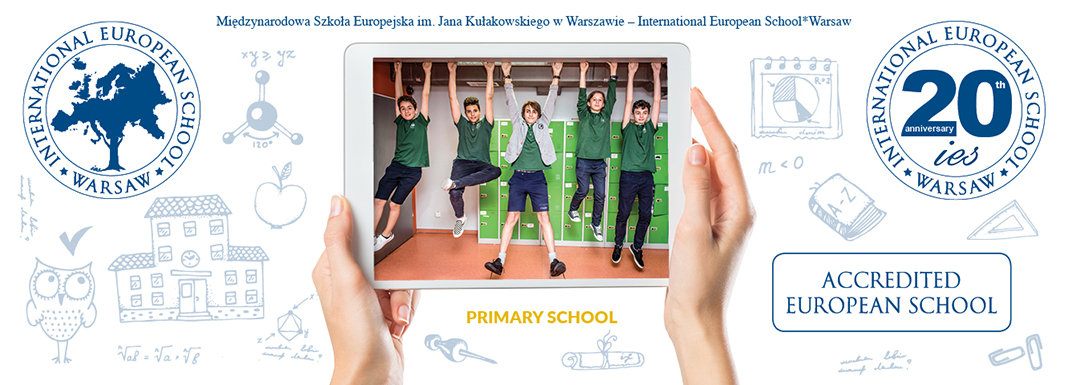
















Secondary Cycles

Secondary School Structure:
Language Teaching
Curriculum
All syllabi in all the language sections of the European Schools follow the European Curriculum. Syllabi can be downloaded from the European Schools website www.eursc.eu. All programmes of study in the different sections lead to the same examination: the European Baccalaureate.
Language sections and L1
Our Secondary school currently has two language sections (English, Polish). All students are placed in the language section of their mother tongue or dominant language (Language I).
We offer L1 mother tongue language courses to pupils without their own language section (English/Polish), providing there are 3 students who need to follow the course.
*Mother tongue lessons require the students to have a reduced time in the language of the section e.g English as they will make up the hours in their mother tongue. If chosen, students are required to maintain the language up to Baccalaureate level and sit exams in it.
*Second language L2 (English, French, German)
Pupils take the majority of subjects in their own language section. To encourage children playing and learning with children from other sections we offer a number of lessons in mixed language groups – for example L2 and European Hours lessons.
SWALS (students without a language section)
Pupils enrolled in the School who do not have a language section corresponding to their mother tongue are enrolled in one of the existing language sections of the school.
Language 2
From Primary P1 until S7 students must study a first foreign language (L2 English, French or German). From S3 onwards, Human Science and Ethics are taught in their L2 language and in S4-S7 the compulsory subjects History and Geography are also taught in L2.
L3 and L4
From S1 all students learn a second foreign language (L3), to be chosen from: English, Polish, French, German, Italian and Spanish. From S4 Students have the opportunity to study a third foreign language (L4), to be chosen from: English, French, German, Italian, Polish and Spanish.
Language Proficiency


Pre-Orientation Cycle S4 and S5

Orientation Cycle S6 and S7
Course Structure S6-S7

During the first week of school in September, the whole school from P2-S7 goes away to ‘green camp’.
The camp is designed to help integrate new students into the school/classes with a variety of trips, class activities, sports and team building exercises. It all takes place away from Warsaw, either by the lakes or seaside. It is an opportuity to integrate new students into the school and for students in new sections to get to know their new teachers.
Throughout the school year, we organise a number of events and competitions that allow children from different language sections to work together. We also hold a number of charity events, where our pupils raise money for local charities. Events include:
European Day
We pay special attention to the European National Days. These are regular school days (with the exception of Swięto Niepodległości or National Independence Day).
Students also partake in European Day on May 9th in collaborative projects with pupils from different language sections.
European days
Psychological and pedagogical support is provided by teachers, class tutors as well as by other specialists employed in the school, such as educators, speech therapist, pedagogical therapist and psychologist.
Our SEN team gives special support for children whose development, growth and learning have been affected by:
The Educational Support offer three types of support programmes which are precisely defined in the Policy on the Provision of Educational Support in the European Schools document.
The three types of support programmes:
* General support
Is for pupils who may experience difficulty in a particular aspect of a subject, may need to ‘catch up’ due to late arrival in the ES system or illness.
* Moderate Support
It might be provided for a longer period than General Support and each pupil has an Individual Learning Plan (ILP).
*Intensive Support
- Intensive support A
This is given following an expert assessment of the child’s needs justified by a medical/psychological/psycho-educational and/or multidisciplinary report. Each pupil has an Individual Learning Plan (ILP).
- Intensive support B
In exceptional circumstances, and on a short-term basis only, the Intensive Support B can be created for a pupil or group of pupils without diagnosed special educational needs. Each pupil has an Individual Learning Plan (ILP).
The key to success: Communication with legal representatives
Parent participation: We consider parents our partners in education and we are very proud of the involvement and support our parents give us.
Parent meetings: Parents will be invited at the beginning of the year to meet teachers. This is organised with the aim of informing parents about the educational system and everyday activities in their child’s group.
Parent participation: We actively encourage and welcome the support and involvement of our parents in the life of the school. Parents are always welcome to discuss any areas of concern with the staff. We encourage each class to have a parent representative. The class representative volunteers to support the teacher by helping to organise class activities – trips, school activities such as St.Nicholas day, Christmas Bazaar, and childrens day. He/she can also act as a contact for new parents.
Communication: We use an online system which all new parents are given access to, so they can write to teachers, keep up to date on their child’s progress, homework & behaviour. There is an ongoing exchange of information between parents and primary staff on a daily basis when appropriate, so that any difficulties can be addressed and achievements recognised.
Parents evenings / reports: The children receive school reports 4 times a year, and there are parents evenings 4 times a year.
Canteen:
Our students can enjoy a daily breakfast, lunch and snack including vegetarian and vegan options provided in the school canteen. The external provider works with lunchtime supervisors and ensures that all meals meet our health requirements. Food brought from home must also meet these requirements, meaning no fast food or sugary snacks.
Library:
All pupils from nursery to secondary have access to our school library. We have a vast array of books available for the children to sign out at different reading levels. They cover a wide range of topics and genres from fiction to non-fiction, scientific to fantasy. Our friendly librarians can help your child find a book to suit their needs, whether they are a voracious or reluctant reader. All Early Years visit the library once a week and Primary children visit frequently. Books that are lost or damaged must be replaced or reimbursed by the family.
Insurance:
The school has accident insurance for all pupils. This insurance covers the students when they are at school, on the school bus or a school trip.
Recycling:
At school we have lots of segregated bins dotted around the school so our rubbish be it paper, metal, plastic or bio can be recycled in the proper fashion.
Personal Belongings
Children in early years and primary are allowed to bring toys to school on Fridays. The school is not responsible for any lost or broken toys. Please evaluate the appropriateness of these toys before taking them to school.
Uniform:
Students are required to wear everyday school uniform to school and ceremonial uniform for trips and special occasions. All information regarding uniforms can be found on the school website.
Lost Property:
Please label your child’s belongings clearly to avoid losing them. You can check our lost property in the event your child loses something. At the end of each term, any belongings that have not been collected will be donated to charity.
Mobile Phones:
Children are not allowed to use mobile devices at school. If parents require that their child carries a mobile device, the device needs to be switched off and kept in the child’s bag during the entirety of the school day. Children have full responsibility for their mobile phones. In addition, we kindly request that parents limit their own use of mobile phones in the school premises.
Bus Transport:
Door to door bus transport is organised by our school. Costs can be found on page 31.
Steps:
Required documents:
Admissions calendar for the 2025/2026 school year:
Tuition Fees for the Accredited European School, Warsaw - 2025/2026:
Optional fees:
(*) All payments in the Accredited European School section of the international European School, Warsaw are given and calculated in Euros.
Bank account of International European School Sp. z o.o .: Bank Pekao S.A IBAN: PL 18 1240 2063 1978 0010 0007 7760
Category III
Tuition Fees for the Accredited European School, Warsaw - 2023/2024:
Tuition fees include:
Tuition fees do not include payment for:
(*) All payments in the Accredited European School section of the international European School, Warsaw are given and calculated in Euros.
School Office:
ul.Wiertnicza 140
02-952 Warszawa
Tel:+48 22 8424448
E-mail: ies@ies-warsaw.pl
Agnieszka Wronowska
Head of Polish Section Primary / Secondary
agnieszka.wronowska@ies.waw.pl
Stewart Cogle
Head of English Section Primary / Secondary
stewart.cogle@ies.waw.pl